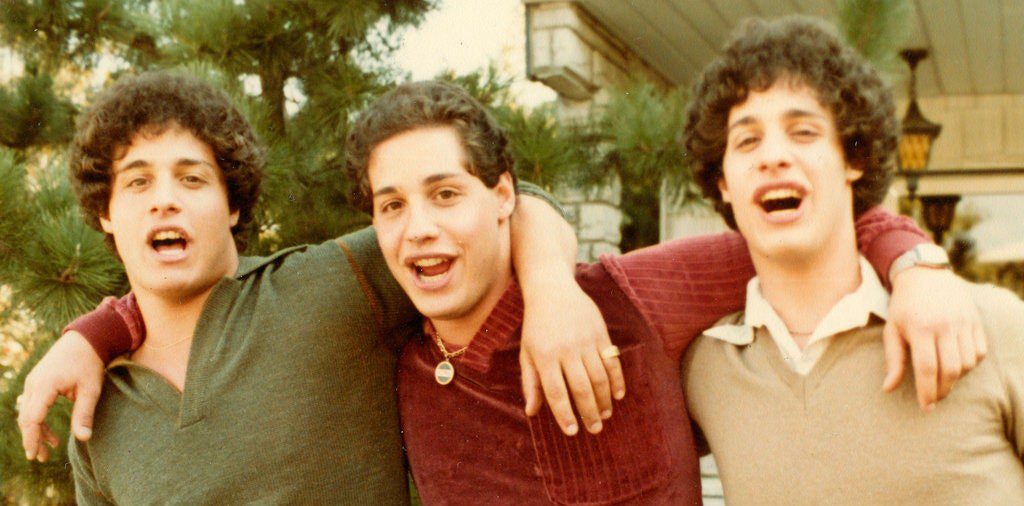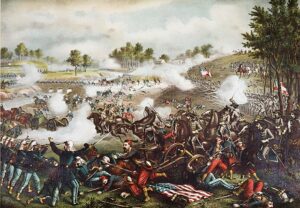Imagine moving into your dorm for the first time, and as you’re trying to get everything settled, several people you’ve never met greet you and call you by an unfamiliar name. Then suddenly somebody screams out that you have a twin. Well, as strange as that is, this exact scenario happened to Bobby Shafran in 1980. Bobby was moving into his dorm and was unfamiliar with the people at Sullivan Community College, in New York, but many of them greeted him and welcomed him back. However, things got strange when they began to call him “Eddy.” After much confusion, Michael, Eddy’s best friend, stepped in and began to ask him if he was adopted, and convinced him to drive to Eddy’s house. Upon arrival, the two long-lost brothers immediately conversed and hugged as if they had known each other their whole lives. Soon the story hit the New York Times, and everybody was in shock with the impossible situation.1 The story was incredibly hard to believe at the time, and it only got more confusing when David Kellman looked down at the newspaper and realized that he was staring down at two of himself. Immediately he called the other families and soon the three boys were reunited. The three families were so caught up with what seemed like a miracle that it was long until they questioned how these three boys got separated at birth back in 1961 by the Louise Wise Adoption Agency.2

Bobby, David, and Eddy at first weren’t occupied in finding out why the agency would separate them. On the other hand, their parents wanted to find out why, so all three families arranged a meeting with those working for the Louise Wise Adoption Agency. The meeting concluded nothing, as the agency only excused the incident by saying that they didn’t believe that a family would take in all three twins. With this simplistic answer, the three brothers continued to flourish in their new fame and seized every opportunity to be together. The boys quickly began to learn how similar their interests were and with the explosion of this news, many shows called them in for live interviews. Everybody was curious about them. They were asked if they had similar taste in food, cars, women, and mannerisms, to which they all answered yes. Bobby, David, and Eddy shared personality traits that amazed all the people watching them on television. In several interviews they revealed how all three had participated in wrestling in junior high and even smoked the same brand of cigarettes.3
When looking at triplets, the genetic makeup is distinctly different from regular siblings and fraternal twins. While fraternal twins only share fifty percent of their DNA code, triplets share one-hundred percent of their DNA code with each other. Identical twins are formed from the exact sperm and egg sharing the same DNA code that predisposes them to a lot of their psychical traits.4

In different studies, twins have been proven to be quite similar in both physical and personality traits. Psychologists had believed that this was due to twins being exposed to the same environment, allowing them to develop quite similarly. However, both nature and nurture contribute factors that predispose people to their personality. While nature deals with genetics, nurture focuses on environmental factors as impacts to one’s self. In this specific case, the triplets realized that heredity was influencing their personality. This can answer why Bobby, Eddy, and David looked exactly alike physically, but also shared many of the same interests, thoughts, mannerisms, and ideas. The idea of nurture was of little influence in this case, because the three brothers were identical in personality regardless of the different environments they were placed in at birth.5
Eddy, Bobby, and David had become so involved in each other’s lives, that they decided to open a restaurant called “Triplets” in New York. The brothers even decided to get an apartment together to make up for lost time. They had been getting along so well, and this only created a stronger bond between the three brothers. What used to be a dream quickly turned into a nightmare for the three men as they started to work together. As time passed, the three brother’s work ethics conflicted and they often had similar ideas for the restaurant. They recognized that not growing up together caused them to be unable to adjust to one another. After a lot of conflict, Bobby Shafran decided to leave the business, which caused a divide between the families. The three brothers eventually got married and Eddy relocated to stay near Bobby and David several times. However, the families we’re not as close, with only Eddy and David running the restaurant. Eddy began to act strange and revealed erratic behaviors, and he was admitted to a psychiatric ward. However, Eddy’s bipolar disorder only worsen, and he committed suicide in 1995. This event reveal that all three had once been admitted for psychiatric help, and it made them question more about the circumstances that had surrounded their birth.6
Eddy’s tragic death only fueled Bobby and David more to reach out to the Louise Wise Adoption Agency to figure out why they had been split up. The head psychiatrist Dr. Peter worked for the Louise Wise Adoption Agency and purposefully orchestrated the separation of not only these three brothers, but other set of twins as well. Dr. Peter oversaw a study on Nature vs Nurture in twins, and gathered several assistants to help conduct it.7 Although many records weren’t released, Bobby had gotten in contact with the assistants in the experiment after many attempts to receive the documents that were sealed off in Yale University. Lawrence Perlman, Dr. Peter’s assistant, revealed that the agency had tried to see the impact of the differences in parenting and in social class on twin personalities. Dr. Peter placed Bobby with a wealthy family, Eddy with a middle class family, and David with a blue-collar family. The research assistants had gone to their homes as they grew up to test what heritable traits they shared in their controlled environments. Dr. Peter’s assistants would also test the boys’ intelligence, emotions, and picture descriptions, and as they grew older, the examinations would become more complex. They had also chosen them carefully to all live within a hundred-mile radius from each other in order to follow up with the children for several years. The study made Bobby and David feel like guinea pigs, and it crossed a lot of personal boundaries that should have been illegal at the time. The assistants disagreed, because at the time the boundaries for scientific research were not greatly restricted.8

Although psychology had been a respectable discipline since the nineteenth century, Social Psychology was coming into its own in the late 1950s and early 1960s. Many psychologists had conducted experiments regarding human nature and the factors that influence personality. At that time, researchers still didn’t have regulations for their experiments. Over time, the American Psychological Association (APA) has established limits and preventions to avoid unethical experiments after continuous disregard for participant awareness.9 The APA’s ethical guidelines mentions debriefing, which is the first step a researcher must take before he or she can construct experimental groups. Debriefing consists of researchers explaining the nature of their experiment to the participants and then allowing them to choose whether they wish to remain a part of the experiment. After the debriefing process, it is also required that researchers explain the confidentiality of the experiment and the role the participants will take. Once the research is conducted, participants get called in to discuss the results or any deceiving, if any, that took place during the experiment.10
The era when the three brothers were born was a time when scientific research in social psychology was still in its unmonitored and undisciplined stage. The assistants in the research conducted by Dr. Peter didn’t feel regret for what they had participated in, even though they later admitted that it was unethical. There was a lot to uncover about the impact of genetics on personality that was tested without much ethical control during the 1950s and 1960s. Overall, the study had concluded that genetics played a huge role on the development of the three brothers, and that mental illness can also be inherited and displayed, regardless of parental involvement or social class. This was one of many experiments that paved the way for the APA’s implementations of ethic standards for scientific experiments.11 But Bobby, David, and Eddy felt used and didn’t accept the excuse for their treatment. Their whole lives were treated as a huge experiment, and it was only a mere coincidence that the three brothers had crossed paths in 1980. After Eddy’s passing, Bobby and David were able to find closure by receiving all the documents from the agency over the experiment. Bobby and David continued their life’s alongside their families after all the tragic news, but later agreed to make a documentary to bring awareness to the issue.
- Emma Shackle, “Three Identical Strangers,” Transpersonal psychology review, (2019): 58-59. ↵
- Leon Hoffman, “Three Identical Strangers and The Twinning Reaction,” The Arts and Medicine, (2019): 10-12. ↵
- Emma Shackle, “Three Identical Strangers,” Transpersonal psychology review, (2019): 58-59. ↵
- Bryanna Moore, “The Strange Tale of Three identical Strangers: Cinematic Lessons in Bioethics,” The Hastings Center Report, (2019): 21. ↵
- Victoria Stern, “Roundup: Nature vs Nurture,” Scientific American Mind, (2014): 73. ↵
- Charlie Brouillard, “Predictive Links Between Genetic Vulnerability to Depression and Trajectories of Warmth and Conflict in the Mother-Adolescent and Father-Adolescent Relationships,” Developmental Psychology, (2019): 1743-1746. ↵
- Emma Shackle, “Three Identical Strangers,” Transpersonal psychology review, (2019): 58-59. ↵
- Leon Hoffman, “Three Identical Strangers and The Twinning Reaction,” The Arts and Medicine, (2019): 10-12. ↵
- Franklin Miller, “Forgoing Debriefing in Deceptive Research: is it ever ethical?” Ethics and Behavior, (2013): 105. ↵
- Malgorzata Oczak, “Debriefing in Deceptive Research: A Proposed New Procedure,” The Journal of Empirical Research on Human Research Ethics: An International Journal, (2007): 49-59. ↵
- Malgorzata Oczak, “Debriefing in Deceptive Research: A Proposed New Procedure,” The Journal of Empirical Research on Human Research Ethics: An International Journal, (2007): 49-59. ↵



71 comments
Sherisa Orozco
This is an intriguing piece of writing. I recall having seen a video about the reunited triplets and the fervor that surrounded them. I had no idea how emotionally going to drain the media and researchers would have been, but seeing the chain reaction of what occurred is tragic. I assume this was a good lesson for both the phycologists that trying to teach someone does not simply treat them as a professional. Well-written article!
Alvaro Garza
Wow, unbelievable! I can’t believe the agency went through with experiments like this one. It makes me wonder how many other people or families have unknowingly become the focus of research questions. The research that was conducted on these boys is extremely unethical, but I would be lying if I said I wasn’t intrigued by the results. I would have guessed that the similarities that twins and triplets share are mostly learned traits.
Danielle Litman
At first, I thought, that’s nice to hear that these long lost twins found each other, but then they turned into into triplets and i was astonished. I did not realize the separation of the triplets was an experiment, but then later on in the article it uncovers the truth. Initially, I believed that this experiment would have been a good discussion between the effects of nature vs nurture, however, it ended up showing the nature of the triplets all being genetically and personality traits. For example, the fact that the all use to smoke the same brand of cigarettes, that was hard to comprehend as being the truth.
Evangelina Villegas
This is an interesting story to read and it was well-written. This article had me go through various emotions as I continued to read the story og Bobby, Eddy, and David. When they all reunited, I was happy for them, but when I read what the Louise Wise Adoption Agency did I was furious. How could that Adoption Agency do that to them and to other children as well? I can’t believe that people would do horrible things that are unethical in the name of research or study.
Vivian Urrutia
article was definitely a rollercoaster of emotions. First, confused because Bobby had no idea what was happening but then, he found out he had two other brothers that were triplets which transmitted me joy. even though they had the same interests in many subjects they had a lot of conflict between them, sharing some psychotic behaviors which lead to the suicide of one of the triplets, Eddie. Later on, in the story, when they shared that they were separated as babies because they were being part of a psychological study which they didn’t know about, I was furious because that situation is unethical in so many levels. After all, it was a very interesting article to read and at the beginning it reminded me a lot to the movie “Parent Trap” which I love.
Eva Lizarraga
It must’ve been such an exciting moment in each of their lives once they realized they had long lost brothers! I’m curious as to what they must’ve been like individually growing up, like if they somehow had feelings that they were missing something. It was pretty disappointing and sad to read about the effects of what came after their reunion, and especially disappointing to read about how the agency treated their entire lives (and were planning on treating their children they same way!) as experiments.
Faith Chapman
Did the adopting parents not realize that something fishy was going on when random people, or people they knew (or suspected) were from Louise Wise Adoption Agency, kept coming to their house and testing their child for several years, or is this a common practice with adoption? Either way, it’s sad that the agency only decided to come clean when one of the brothers died, and not when they were questioned the first time; they may have been telling the truth when they said they thought no one would take all three boys, but if they had came clean while the parents were there, they might’ve been able to get the documents sooner and realize that Eddy would need more help, or at least that their kids’ mental/emotional wellbeing was at risk.
Julia Aleman
This is such an interesting writing. I remember seeing a video about the reunited triplets and the excitement that heavily surrounded it. I never thought of how mentally draining the media and scientists would’ve treated them with, but seeing the domino effect of what it came to be is tragic. I think this was a good lesson the phycologists that studding someone does not mean to treat them like an object, but to let them live peacefully in their own environment.
Eric Hernandez
I think this story was amazing and heart breaking. It was crazy to see how these brothers somehow managed to find each other after years of being apart. It was also really interesting how they were able to discover how they were all a part of this study. I also think that studies like these should be stopped so that siblings are no longer separated at birth and are able to live normal lives.
Pedro Lugo Borges
Wow, the way she present the story was so interesting I didn’t know that they part of an experiment till the big reveal, and it was so interesting that the adoption agency allowed for this extremely unethical study. Part of me is mad that he choice the social economic class on purpose he choice how fortunate these boy will be. I like how the study both showed a correlation between behavior and genetic/mental diseases, but that that wasn’t the only factor to contribute to the way a person live as seen by the result of their restaurant venture. Even though this was an unethical experiment it did show a lot of useful data that people in a lot of field could use to help other people it just sucked that these people had to be used as guinea pigs.
Alexis Lopez
This article was such a fun and interesting read. I remember hearing about this story but never really looked more into it. Azucena Cuevas provided amazing background knowledge on their journey and how they ended up accidentally meeting each other. I actually didn’t know that their DNA code was different from each other even though they are triplets. Overall, this was a great and informational read.